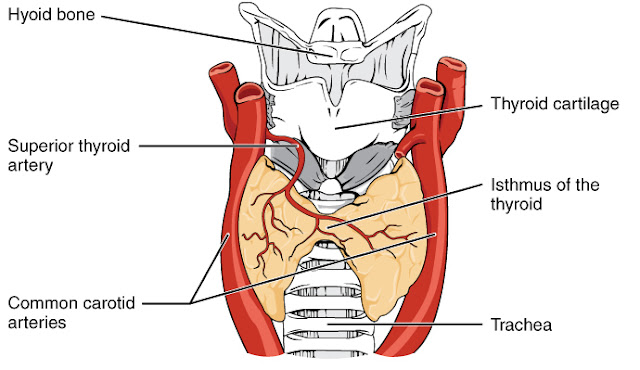 |
| The thyroid gland is commonly called simply as thyroid. It is an endocrine gland |
Thyroid Dysfunction is very common. About 5 to 6 % are said to be affected by this disorder. However a large portions of affected people are don't even aware that they have thyroid disorders. Some symptoms of thyroid disorders are also misunderstood by patients and they try to treat the symptoms in other means without going through Thyroid Function Tests. Although it is common but if left untreated it can cause severe damage to our heart and definitely to women looking ahead to motherhood.
Overview of Thyroid Gland
The thyroid gland is commonly called simply as thyroid. It is an endocrine gland. Small two inches butterfly shaped gland located at the back of throat and in front of windpipe called Trachea, just below the voice box (larynx) . It is quite powerful like pump house. It secretes hormones which runs freely in bloodstreams. It regulates the major functions of the body like metabolism which is the main function of getting energy from food intake, making proteins, maintaining body temperature, heart rate and controlling the body's sensitivity with respect to other hormones. It extracts iodine from blood and incorporates into thyroid hormones.Thyroid Hormones
Thyroid Gland produces two major hormones namely- T3 - triodothyronine. It contains 3 atoms of iodine per molecule, so it is named as T3
- T4 - thyroxin or tetraiodothyronine. It contains 4 atoms of iodine per molecule
And two other are called peptide hormone and calcitonin
Pituitary Gland produces Thyroid Stimulating Hormone (TSH) which controls and monitors the amount of T3 and T4 produced and released by thyroid gland.
Common Thyroid Disorders
The following are the specific kind of disorders commonly found in patients
Hyperthyroidism -
Overactive gland results excessive production of thyroid hormone. It affects 1 to 2 percent of women. It is less common in men. Free T4 is more than its range value. It shows symptoms like
- Fast Heart Rate
- Anxiety and Depression
- Weight loss
- Irritability
- Cognitive Slowing
- Excessive Sweating
- Disruptive Sleep Pattern
- Irregular Menstrual Cycle
- Brittle Hairs and Nails
Hypothyroidism -
Under production of the thyroid glands just opposite of Hyperthyroidism which results lack of T3 and T4 levels in blood. It can develop from and within the thyroid gland , pituitary gland or hypothalamus. It has specific symptoms such as
- Excessive Weight Gain
- Fatigue
- Dry Skin
- Harsh Voice
- Irregular Menstrual Cycle
- Feeling Cold
- Joint and Muscle Ache
- Constipation
- Depression
- Fluid Retention
Hashimoto's Disease
It is also known as chronic lymphocytic thyroiditis. It is the most common cause of hypothyroidism. It can attack at any age however it's most common in middle-aged women. Hashitomo's disease occurs when body's immune system mistakenly destroy the thyroid gland and its ability to produce hormone.
For some cases the symptoms are subtle and the disease can remain stable for years without further damage. These symptoms are not very specific other than hypo and hyper thyroidism. Symptoms are
- Depression
- Constipation
- Fatigue
- Mild Weight Gain
- Dry Skin
- Dry Thinning Hair
- Pale, Puffy face
- Heavy and Irregular Menstruation
- Enlarged Thyroid
- Intolerance to Cold
Goiter
It is seen as a bulge in the neck.
A Goiter is simply described as enlargement of thyroid gland, regardless of cause. It is benign in nature. Iodine deficiency is the most common cause of goiter. However other causes may be associated with hypothyroidism , hyperthyroidism or normal thyroid function.
It can affect at any age and women are more vulnerable to goiter. Other risk factors include family medical history, medicinal side-effect, pregnancy and radiation exposure.
Initially goiter does not show any major symptoms but when it grows enough then it may cause the following symptoms :
- Swelling and tightness in the neck
- Difficulties in Breathing
- Coughing and Wheezing
- Hoarseness of Voice
Thyroid nodules
Nodules are lumps in and on thyroid gland. The causes are not clearly known but it is understood iodine deficiency and Hashitomo's disease are one of the possibilities.. The nodules can be solid or fluid filled.
Most of the nodules are benign but sometimes it can be malignant. Mostly these do not show any symptoms but varies with the sizes.
Some nodules produce thyroid hormone, causing abnormality like Hypothyroidism and Hyperthyroidism symptoms.
Grave's disease
It is an autoimmune disorder which causes problem to thyroid gland. This can hamper normal function of thyroid gland and produces extra hormone which eventually affect total metabolism of the body.
This disease is hereditary and may develop at any age. Women are more affected than men. Stress. pregnancy and smoking are known factors to the disease.
The symptoms are common to hyperthyroidism.
Thyroid Cancer
Thyroid cancers are far more common among women than men. There are different types of thyroid cancer depending upon the nature of developed cells. Most cases of thyroid cancer have high survival rates. However early detection is the key like all cases of cancer.Thyroid Hormone Tests
It is mainly blood tests that include
- Total Thyroxine (T4)
- Free Thyroxine FTI or FT4)
- Triiodothyronine (T3)
- TSH
Conditions if Thyroid Disorder is left untreated
When any condition of the thyroid is ignored, the effect is seen on the other organs. The hormone is flowing free in the blood and travels to all part of the body and hence can impact various organs. Therefore normal life can get affected severely.
It is also commonly seen that a large number of affected people do not go for thyroid treatment. Based on the symptoms they prefer alternative treatment , naturopathy, some yoga etc. But it is also required expertise and proper monitoring system to eliminate the disorders.
Untreated Thyroid Disorder could lead to the above symptoms noted under various disorders and the following are in addition to those
For Hyperthyroidism
- Hypertension
- Sudden cardiac arrest
- Arthythmia (abnormal heartbeat)
- Cardiac Dilatation
- Pregnancy Problems such as miscarriage, preterm birth, preeclampsia ( high blood pressure during pregnancy), fetal thyroid dysfunction and poor fetal growth.
For Hypothyroidism
- Developing Goiter
- Atherosclerosis leading to conditions like stroke
- Increase in cholesterol level
- Problems of infertility
- Weakness
- Malaise
If diagnosed with thyroid dysfunction
If diagnosed with Hyper/Hypothyroidism person need to consult an endocrinologist who shall be putting the patient on medicines to bring the thyroid levels back to normal. There is no alternative to this so far.
In addition to above some modification of lifestyle will help to faster recovery like
- Regular check up and consultation with the doctor
- Drink adequate water to flush out the toxin
- Exercise regularly (guided)
- Increase Fiber intake
- Take green tea
- Avoid caffeine, nicotine and alcohol
Final Thought
Having Thyroid dysfunction is very common and treatable condition. But if left untreated can cause severe ailment and hamper day-to-day activities. Consult with doctor and get tested once in every year to check any thyroid dysfunction . Changed and controlled lifestyle can eliminate symptoms and help faster recovery.


















